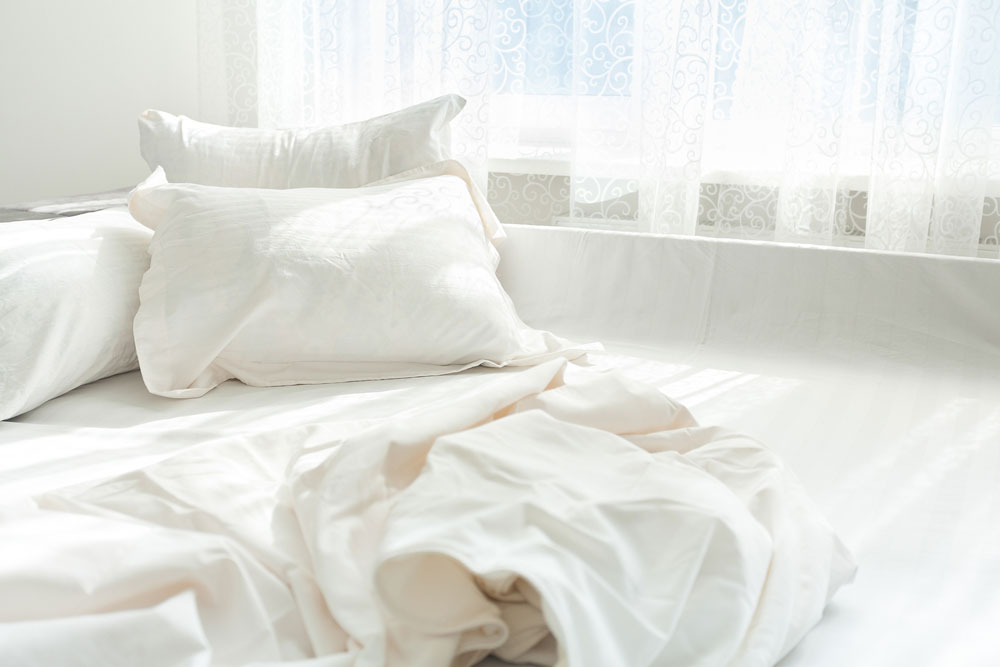Have you ever wondered what the best temperature for sleep is? Sleep scientists have found some surprising answers.
In the chilly season, a warm blanket around your body feels heavenly. You feel your eyes shut and drift into dreamland in what feels like a matter of minutes. You may find you fall asleep easier in the winter, and there’s a reason for that.
Cold and Sleep
The researchers found that cold helps your sleep. 80 percent of people surveyed by Sleep Rate said they sleep better when it is cold out. Thermoregulation is a key part of the explanation. As Stanford Biology professor H. Greg Heller told WebMD, “When you go to sleep, your set point for body temperature—the temperature your brain is trying to achieve—goes down. Think of it as an internal thermostat.” That drop in body temperature induces sleep.
So, the reason a hot shower makes you fall asleep easier is counterintuitive. The water helps your body temperature rise. Then, you leave the shower and the air in your home feels colder. It’s actually the effect of the colder-feeling air that helps you sleep better.
Dr. Shukla is a New York City sleep specialist. Contact Dr. Shukla to find out about diagnosing sleep disorders and how they may be affecting your life.
Heat and the Sleep Cycle
Feeling hot when you sleep interferes with your slow wave sleep (SWS) and rapid eye movement (REM) sleep. Feeling cold does not. This interference makes you wake up when you feel hot. This was the conclusion reached by a scientific study on the effects of temperature on sleep. If you have insomnia, it may be due to your body temperature rising too high at night.
The Best Temperature for Sleep
Heller says most people should keep their rooms between 65 and 72 degrees Fahrenheit. The American Sleep Society advises a cooler temperature — between 60 and 67.
“If the room becomes uncomfortably hot OR cold, you are more likely to wake up,” says Ralph Downey III, PhD, chief of sleep medicine at Loma Linda University. It is the slight cooling of the body that makes sleep possible. Too cold is still too cold.
Still, Heller recommends finding your personal comfort zone to discover the best temperature for sleep. Experiment with the thermostat for a few nights and see what makes you sleep well.
For help understanding your sleeping habits and treating sleep disorders, reach out to Dr. Shukla today!
Good Sleep Hygiene
Experts have other strategies for creating good sleeping conditions. The American Academy of Sleep Medicine advises thinking of a bedroom as a cave: It should cool, quiet, and dark.
Beware of memory foam pillows. They may feel soft, but they can heat up during the night and disrupt your sleep. Wear socks when you go to bed. Cold feet are a major cause of insomnia or waking at night. To this end, you can also put a hot water bottle at your feet under the covers.
You can also buy bedding products like gel or silicone mattress covers, They remove moisture and heat. Finally, installing a ceiling fan above your bed can help keep you cool throughout the night.
Sleep Doctor NYC
Dr. Shukla specializes in sleep medicine as well as asthma and allergy medicine. He serves the Ney York City area with offices in Brooklyn, Staten Island, Queens, and Manhattan. He has won many awards for being a top sleep doctor in New York. Dr. Shukla treats thousands of patients per year. Contact Dr. Shukla to schedule a video consultation today!

